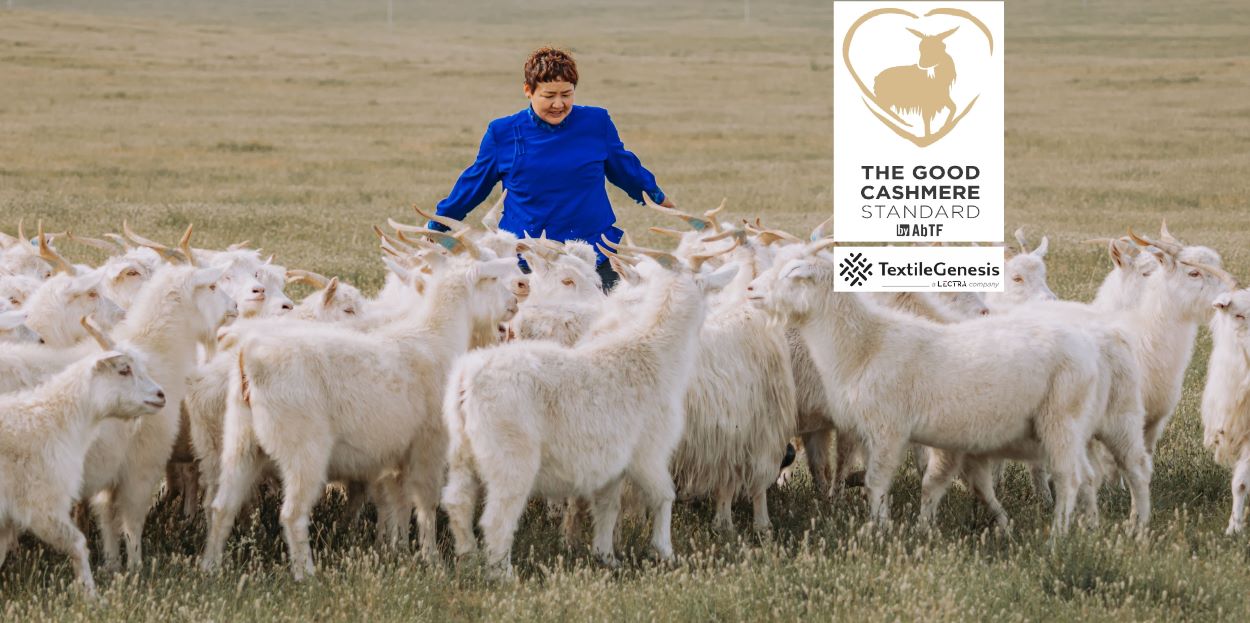
Revised Good Cashmere Standard Boosts Level of Animal Welfare And Transparency - AbTF
Aid by Trade Foundation (AbTF) is boosting the
credentials of The Good CashmereStandard® (GCS) by revising the standard’s
criteria and embarking on a new collaboration with TextileGenesis, A Lectra
Company.
The Good CashmereStandard® is an independent seal for
sustainably produced and traceable cashmere fibres from Inner Mongolia. The
latest Version 2.0 of the standard, places greater emphasis on animal welfare
in cashmere production. In addition, AbTF is underlining its commitment to
transparency and traceability in the production chain by working with
TextileGenesis which provides a platform for tracing textile supply chain.
“We are certain that the Aid by Trade Foundation’s
revision of The Good Cashmere Standard will serve to further prioritise the
welfare of the goats,” states Tina Stridde, Managing Director of Aid by Trade
Foundation. She added, “To accelerate progress towards achieving transparency
and traceability from raw cashmere to the final product, we are working with
TextileGenesis, an established, technologically innovative platform.”
The Good Cashmere
Standard 2.0
Following its revision, GCS Version 2.0 is built on four
pillars that encompass the key aspects of sustainable cashmere production:
cashmere goat welfare, the environment, people, and management. With these
pillars and the accompanying criteria, GCS is effectively and comprehensively
moving cashmere production towards greater sustainability, both at the farms
and in the first stage of processing cashmere fibres, which takes place at
buying and dehairing stations.
The revision revolves around goat welfare which was
developed on the basis of David J. Mellor’s model of five domains of animal
welfare. This addresses five clearly defined aspects: nutrition, environment,
health, behaviour, and mental state. Fulfilling the criteria of this pillar
means not only meeting the goats’ physical needs but also providing them with
positive emotional experiences.
AbTF is also launching a pilot project for animal
welfare assessments. The assessments are based on the Animal Welfare Indicator
Protocol (AWIN) and taken together with GCS criteria to draw a comprehensive
picture of animal welfare conditions.
To supplement the detailed information collected through
audits, at least one indicator was selected for each of the assessment’s four
sections - nutrition, environment, health, and behaviour - as a way of taking
the animals’ perspective into account as well. Several auditors in China have
already been trained as animal welfare assessors for this purpose. After evaluation
of the pilot project results, further implementation of the programme for
animal welfare assessments on farms in Inner Mongolia is planned.
Revision of GCS standards also addresses other three pillars:
people, management, and the environment. It provides clear guidelines for
protecting biodiversity and land through land management, achieving dignified
labour conditions for all people involved in cashmere fibre production and
ensuring compliance with responsible business practices, the verification
process and GCS values.
The implementation of The Good Cashmere Standard 2.0 and
its criteria will be mandatory as of 2025 and will be monitored through
independent verifications at regular intervals.
Collaboration with
TextileGenesis
Transparency and traceability in cashmere production are
core concerns for the Aid by Trade Foundation with regard to the implementation
of The Good Cashmere Standard. AbTF thus plays a major role in ensuring that
companies and brands can comply with the rising requirements for responsible
textile production. Since the very beginning, the standard has required
producers to separate verified cashmere from non-verified cashmere. Compliance
with these requirements is monitored through audits. And products that really
contain verified cashmere wool can bear the GCS label or a product with The Good Cashmere
Standard label must contain only verified cashmere.
Until now, the implementation of these requirements for
processing cashmere wool has been documented in AbTF’s proprietary tracking
system; going forward, GCS-verified cashmere will be traced through
TextileGenesis, A Lectra Company. “For fashion brands, guaranteeing the
transparency and reliability of their supply chain has become a key issue. By
entering into this partnership with The Good Cashmere Standard, our aim is to
promote full traceability of responsible cashmere, from the place where the
goats are reared to the point of sale," explains Amit Gautam, the founder
and CEO of TextileGenesis.
Christian Barthel, the head of business development at
the Aid by Trade Foundation, adds, “At The Good Cashmere Standard, we place
great value on traceability and transparency. We began by investing in a robust
system that enables us to trace every order back to the cashmere producer. Now,
we are excited to reinforce this commitment by partnering with TextileGenesis
to offer both current and future partners the option of working through an
established and technologically innovative platform.”
.jpg)
The Good CashmereStandard® is an independent seal for sustainably produced and traceable cashmere fibres from Inner Mongolia. The latest Version 2.0 of the standard, places greater emphasis on animal welfare in cashmere production, transparency and traceability in the production chain by working with TextileGenesis.
If you wish to Subscribe to Textile Excellence Print Edition, kindly fill in the below form and we shall get back to you with details.












